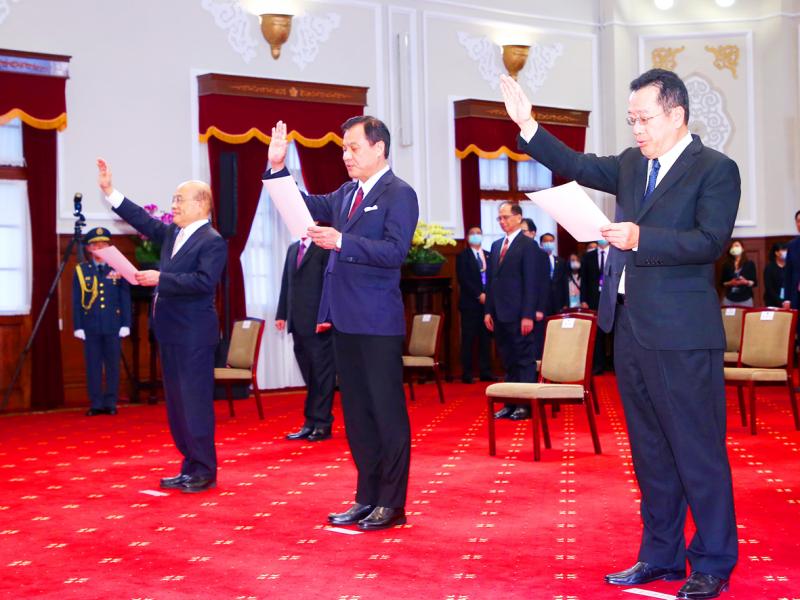Presidential Office Secretary-General Su Jia-chyuan (蘇嘉全) yesterday resigned after his nephew, Democratic Progressive Party (DPP) Legislator Su Chen-ching (蘇震清), was implicated in a bribery case related to a dispute over the ownership of Pacific Sogo Department Store (太平洋崇光百貨).
“I resigned from the post so that President Tsai Ing-wen (蔡英文) would not be bothered by it anymore, and the prosecutors can investigate the case in a fair and just manner. I thank President Tsai once again for supporting me. May the country continue to prosper under her leadership,” Su Jia-chyuan said in a statement.
The Presidential Office said that Tsai has accepted Su Jia-chyuan’s resignation, adding that Presidential Office deputy secretary-general Jason Liu (劉建忻) would serve as acting director-general.

Photo: CNA
The former Legislative Yuan speaker assumed the post at the Presidential Office when Tsai started her second term on May 20.
“I have been doing my job as a chief of staff at the Presidential Office with fear and trembling with the hope of sharing the burden borne by the president. However, all the mudslinging campaigns against me, as well as the scandal that involves my nephew, have caused trouble for the president. For this I am deeply sorry,” Su Jia-chyuan said in the statement.
He said that he has never “crossed the line” in his 30-year-long political career and has nothing to hide, adding that he and his wife have never been investigated or indicted in any corruption cases.
He also said that he would not accept an unsubstantiated and twisted allegation that he has abused his authority to benefit his relatives, adding that he would vigorously defend his innocence.
Taipei prosecutors on Saturday filed a motion to detain Su Chen-ching, along with four other former and incumbent lawmakers as part of an investigation into bribery allegations against six current and former legislators and their aides.
The court hearing on whether to grant the prosecutors’ request to detain them was ongoing as of press time last night.
The DPP’s anti-corruption committee convened a meeting at 8pm to discuss the penalties for Su Chen-ching and former legislator Mark Chen (陳唐山), who has also been implicated in the case and was released on NT$500,000 bail early on Saturday.
Based on the party’s anti-corruption guidelines, the committee would first investigate the charges against the two, and each would be given an opportunity to tell their side of the story.
The guidelines also stipulate that the committee can still make a decision even if it does not hear from Su Chen-ching, as long as half of the committee members are present.
“The case has entered legal proceedings. We hope that judicial institutions can quickly clarify the details so justice can be served,” the DPP said.
Political insiders in Pingtung County have said that Su Chen-ching, who has been a legislator since 2008, has been aggressively setting up his campaign to run for county commissioner in 2022.
His implication in the corruption scandal could severely disrupt his plan, they said.

US President Donald Trump yesterday announced sweeping "reciprocal tariffs" on US trading partners, including a 32 percent tax on goods from Taiwan that is set to take effect on Wednesday. At a Rose Garden event, Trump declared a 10 percent baseline tax on imports from all countries, with the White House saying it would take effect on Saturday. Countries with larger trade surpluses with the US would face higher duties beginning on Wednesday, including Taiwan (32 percent), China (34 percent), Japan (24 percent), South Korea (25 percent), Vietnam (46 percent) and Thailand (36 percent). Canada and Mexico, the two largest US trading

AIR SUPPORT: The Ministry of National Defense thanked the US for the delivery, adding that it was an indicator of the White House’s commitment to the Taiwan Relations Act Deputy Minister of National Defense Po Horng-huei (柏鴻輝) and Representative to the US Alexander Yui on Friday attended a delivery ceremony for the first of Taiwan’s long-awaited 66 F-16C/D Block 70 jets at a Lockheed Martin Corp factory in Greenville, South Carolina. “We are so proud to be the global home of the F-16 and to support Taiwan’s air defense capabilities,” US Representative William Timmons wrote on X, alongside a photograph of Taiwanese and US officials at the event. The F-16C/D Block 70 jets Taiwan ordered have the same capabilities as aircraft that had been upgraded to F-16Vs. The batch of Lockheed Martin

GRIDLOCK: The National Fire Agency’s Special Search and Rescue team is on standby to travel to the countries to help out with the rescue effort A powerful earthquake rocked Myanmar and neighboring Thailand yesterday, killing at least three people in Bangkok and burying dozens when a high-rise building under construction collapsed. Footage shared on social media from Myanmar’s second-largest city showed widespread destruction, raising fears that many were trapped under the rubble or killed. The magnitude 7.7 earthquake, with an epicenter near Mandalay in Myanmar, struck at midday and was followed by a strong magnitude 6.4 aftershock. The extent of death, injury and destruction — especially in Myanmar, which is embroiled in a civil war and where information is tightly controlled at the best of times —

China's military today said it began joint army, navy and rocket force exercises around Taiwan to "serve as a stern warning and powerful deterrent against Taiwanese independence," calling President William Lai (賴清德) a "parasite." The exercises come after Lai called Beijing a "foreign hostile force" last month. More than 10 Chinese military ships approached close to Taiwan's 24 nautical mile (44.4km) contiguous zone this morning and Taiwan sent its own warships to respond, two senior Taiwanese officials said. Taiwan has not yet detected any live fire by the Chinese military so far, one of the officials said. The drills took place after US Secretary